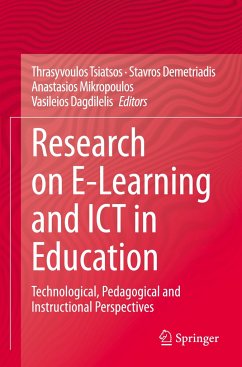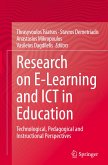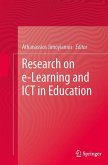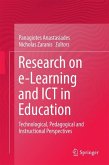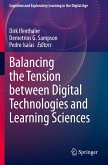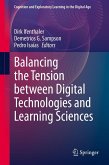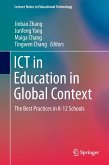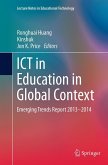Research on E-Learning and ICT in Education
Technological, Pedagogical and Instructional Perspectives
Herausgegeben:Tsiatsos, Thrasyvoulos; Demetriadis, Stavros; Mikropoulos, Anastasios; Dagdilelis, Vasileios
Research on E-Learning and ICT in Education
Technological, Pedagogical and Instructional Perspectives
Herausgegeben:Tsiatsos, Thrasyvoulos; Demetriadis, Stavros; Mikropoulos, Anastasios; Dagdilelis, Vasileios
- Broschiertes Buch
- Merkliste
- Auf die Merkliste
- Bewerten Bewerten
- Teilen
- Produkt teilen
- Produkterinnerung
- Produkterinnerung
This volume includes contributions based on selected full papers presented at the 11th Pan-Hellenic and International Conference "ICT in Education", held in Greece in 2018. The volume includes papers covering technical, pedagogical, organizational, instructional, as well as policy aspects of ICT in Education and e-Learning. Special emphasis is given to applied research relevant to the educational practice guided by the educational realities in schools, colleges, universities and informal learning organizations. This volume encompasses current trends, perspectives, and approaches determining…mehr
Andere Kunden interessierten sich auch für
![Research on E-Learning and ICT in Education Research on E-Learning and ICT in Education]() Research on E-Learning and ICT in Education104,99 €
Research on E-Learning and ICT in Education104,99 €![Research on e-Learning and ICT in Education Research on e-Learning and ICT in Education]() Research on e-Learning and ICT in Education112,99 €
Research on e-Learning and ICT in Education112,99 €![Research on e-Learning and ICT in Education Research on e-Learning and ICT in Education]() Research on e-Learning and ICT in Education75,99 €
Research on e-Learning and ICT in Education75,99 €![Balancing the Tension between Digital Technologies and Learning Sciences Balancing the Tension between Digital Technologies and Learning Sciences]() Balancing the Tension between Digital Technologies and Learning Sciences160,49 €
Balancing the Tension between Digital Technologies and Learning Sciences160,49 €![Balancing the Tension between Digital Technologies and Learning Sciences Balancing the Tension between Digital Technologies and Learning Sciences]() Balancing the Tension between Digital Technologies and Learning Sciences112,99 €
Balancing the Tension between Digital Technologies and Learning Sciences112,99 €![ICT in Education in Global Context ICT in Education in Global Context]() ICT in Education in Global Context75,99 €
ICT in Education in Global Context75,99 €![ICT in Education in Global Context ICT in Education in Global Context]() ICT in Education in Global Context75,99 €
ICT in Education in Global Context75,99 €-
-
-
This volume includes contributions based on selected full papers presented at the 11th Pan-Hellenic and International Conference "ICT in Education", held in Greece in 2018. The volume includes papers covering technical, pedagogical, organizational, instructional, as well as policy aspects of ICT in Education and e-Learning. Special emphasis is given to applied research relevant to the educational practice guided by the educational realities in schools, colleges, universities and informal learning organizations.
This volume encompasses current trends, perspectives, and approaches determining e-Learning and ICT integration in practice, including learning and teaching, curriculum and instructional design, learning media and environments, teacher education and professional development. It is based on research work originally presented at the conference, but the call for chapters was open and disseminated to the international community attracting also international contributions.
This volume encompasses current trends, perspectives, and approaches determining e-Learning and ICT integration in practice, including learning and teaching, curriculum and instructional design, learning media and environments, teacher education and professional development. It is based on research work originally presented at the conference, but the call for chapters was open and disseminated to the international community attracting also international contributions.
Produktdetails
- Produktdetails
- Verlag: Springer / Springer International Publishing / Springer, Berlin
- Artikelnr. des Verlages: 978-3-030-64365-2
- 1st edition 2021
- Seitenzahl: 308
- Erscheinungstermin: 10. März 2022
- Englisch
- Abmessung: 235mm x 155mm x 17mm
- Gewicht: 470g
- ISBN-13: 9783030643652
- ISBN-10: 3030643654
- Artikelnr.: 63426672
- Herstellerkennzeichnung
- Springer Nature c/o IBS
- Benzstrasse 21
- 48619 Heek
- Tanja.Keller@springer.com
- Verlag: Springer / Springer International Publishing / Springer, Berlin
- Artikelnr. des Verlages: 978-3-030-64365-2
- 1st edition 2021
- Seitenzahl: 308
- Erscheinungstermin: 10. März 2022
- Englisch
- Abmessung: 235mm x 155mm x 17mm
- Gewicht: 470g
- ISBN-13: 9783030643652
- ISBN-10: 3030643654
- Artikelnr.: 63426672
- Herstellerkennzeichnung
- Springer Nature c/o IBS
- Benzstrasse 21
- 48619 Heek
- Tanja.Keller@springer.com
Thrasyvoulos Tsiatsos is currently Associate Professor in the School of Informatics of Aristotle University of Thessaloniki, Greece and a member of the Software and Interactive Technologies (SWITCH) Lab. He obtained his Diploma, his Master's Degree and his PhD from the Computer Engineering and Informatics Department of Patras University (Greece). His research interests include Virtual Learning Environments, Serious Games and Gamification and Open and Distance Education. He has published more than 220 papers in Journals and in well-known refereed conferences and he is co-author in 4 books. He has been a PC member and referee in various international journals and conferences. He was coordinator or member of the research team in more than 40 R&D national and international projects in the area of Technology Enhanced Learning. Also, he is IEEE member. Stavros Demetriadis, is Professor at the School of Informatics, Aristotle University of Thessaloniki(AUTh), Greece. He holds a BSc degree in Physics, MSc in Electronic Physics, and PhD in Multimedia educational technology from Aristotle University of Thessaloniki. He teaches courses and conducts research in the broader area of technology-enhanced learning with emphasis on Computer-supported collaborative learning (CSCL), Adaptive hypermedia systems for learning, Educational robotics and Tangible interfaces for programming, Conversational agents, Multimedia learning, Cognitive training technologies. He has published more than 150 research papers in international scientific journals (with IF) and international/national conference proceedings with more than 3100 third party citations. He is member of the scientific committee in several top ranking international Conferences each year (such as IEEE ICALT, ECTEL, CSEDU, etc.). His supervised PhD project "Cubes Coding" was presented with awards in two international competitions (Open Education Challenge 2014 and NUMA-2014). His conferencearticles have received three times "Best paper" awards and one article has been highlighted as 'spotlight paper' by the IEEE Transactions of Learning Technologies journal. Since 1995 he has participated in many AUTH research projects and currently is project leader in the EU funded Erasmus+ KA2 project: "colMOOC: Integrating Conversational Agents and Learning Analytics in MOOCs". He is a Python enthusiast and offers regularly a MOOC on "Introductory programming with Python" from Open edX platform in Greek. Tassos Anastasios Mikropoulos is Professor in the Department of Primary Education, School of Education, University of Ioannina, Ioannina, Greece. Dr. Tassos Anastasios Mikropoulos holds a B.Sc. in Physics and a Ph.D. in optical signal processing from the University of Athens. He is the director of the "Educational Approaches to Virtual Reality Technologies laboratory, EARTH lab". He is the elected chair of the Hellenic Association of ICT in Education - HAICTE. His research interests are on educational technology, virtual reality in education and educational neuroscience. Mikropoulos' work has been published in many referred journals and conferences with more than 2000 citations. He is a member of the editorial board and reviewer for many international journals. He has been project director, principle investigator and consultant in numerous research & development and educational projects. He also serves as a consultant for the Greek Ministry of Education in topics such as digital school, educational software, in-service teachers' further training. Vasileios Dagdilelis is Professor in the Department of Educational and Social Policy, School of Social Sciences, Humanities and Arts, University of Macedonia, Thessaloniki, Greece. He obtained his Diploma in Mathematics from Aristotle University of Thessaloniki, his Master's Degree from the University Joseph Fourier, Grenoble, France and his Ph.D. from the Department of Applied Informatics, University of Macedonia. His research interests include Didactics of Informatics, Applications of Informatics and Computer Science to Education, Educational Robotics, Distance Learning, Adult Education. He has published more than 100 papers in Journals and in well-known refereed conferences and he is co-author in several books. He has participated in several R&D projects as well and currently participate in the Horizon European Project STIMEY, for Educational and Social Robotics.
Continuance intention to use mobile learning in terms of motivation and technology acceptance.- The Effect of a Computational Thinking Instructional Intervention on Students' Debugging Proficiency Level and Strategy Use.- A Two-year Evaluation of Distributed Pair Programming Assignments by Undergraduate Students.- Technology Readiness and Actual Use of Greek School Network by Primary Teachers.- Augmented Reality Books: What Student Teachers Believe About Their Use in Teaching.- Community of Inquiry Model in Online Learning: Development Approach in MOOCs.- Computational Thinking assessment: Literature review.- The educational value and impact of serious games in cognitive, social and emotional development in middle childhood - Perceptions of teachers in Greece.- A Framework Proposal for Interdisciplinary Early Childhood Education integrating ICT and Foreign Language.- Goodbye linear learning: Posthumanism in dialogue with Indian communication theory on online education.- Users' preferences for pedagogical e-Content: A utility/usability survey on the Greek Illustrated Science Dictionary for School.- Microgenetic analysis of the educational robotics as mindtools. A case in the construction of the concept speed.- Bringing informal e-learning into the school English as a second language classroom - what do e-sports do to learning?.- Impact assessment and Retention Rate of MOOCs for supporting Dual Career of Athletes.- Human-centered Design Principles for Actionable Learning Analytics.
Continuance intention to use mobile learning in terms of motivation and technology acceptance.- The Effect of a Computational Thinking Instructional Intervention on Students' Debugging Proficiency Level and Strategy Use.- A Two-year Evaluation of Distributed Pair Programming Assignments by Undergraduate Students.- Technology Readiness and Actual Use of Greek School Network by Primary Teachers.- Augmented Reality Books: What Student Teachers Believe About Their Use in Teaching.- Community of Inquiry Model in Online Learning: Development Approach in MOOCs.- Computational Thinking assessment: Literature review.- The educational value and impact of serious games in cognitive, social and emotional development in middle childhood - Perceptions of teachers in Greece.- A Framework Proposal for Interdisciplinary Early Childhood Education integrating ICT and Foreign Language.- Goodbye linear learning: Posthumanism in dialogue with Indian communication theory on online education.- Users' preferences for pedagogical e-Content: A utility/usability survey on the Greek Illustrated Science Dictionary for School.- Microgenetic analysis of the educational robotics as mindtools. A case in the construction of the concept speed.- Bringing informal e-learning into the school English as a second language classroom - what do e-sports do to learning?.- Impact assessment and Retention Rate of MOOCs for supporting Dual Career of Athletes.- Human-centered Design Principles for Actionable Learning Analytics.

